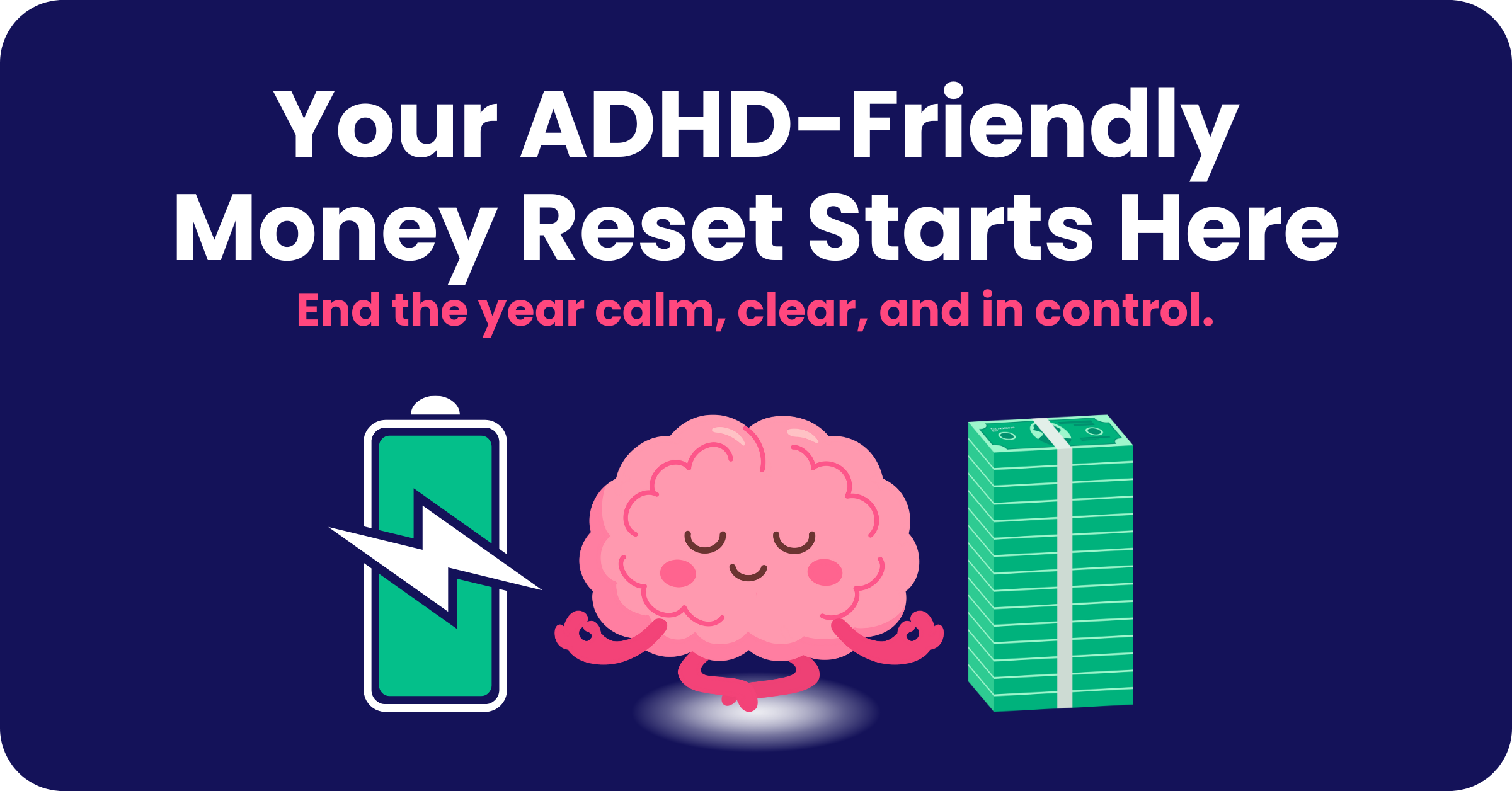How to Build ADHD-Friendly Money Habits That Actually Stick This Year
Does reviewing your finances make your ADHD brain scream "let's reorganize the junk drawer instead"? You're not broken, your brain just needs...
8 min read
 Dave DeWitt
:
October 20, 2025
Dave DeWitt
:
October 20, 2025
It's late October, and that familiar knot is already forming in your stomach.
You know what's coming, another holiday season of financial chaos, impulse purchases you'll regret, and that crushing January credit card hangover that makes you swear "never again."
But here's what most financial experts won't tell you about ADHD brains: You're not broken, and you don't lack willpower.
After working with countless ADHD clients, I've discovered the shocking truth. 87% of people with ADHD overspend by an average of $2,400 during the holidays, not because they're irresponsible, but because every traditional budgeting method completely ignores how their brains actually work.
I'm about to reveal the breakthrough that changed everything: Late October isn't just another month, it's your secret weapon.
Right now, while your executive function isn't depleted and stress hasn't hijacked your decision-making, you have a golden 7-day window to create systems that work WITH your ADHD brain instead of against it.
This is the exact 3-part framework that helped my client Sarah transform from spending $3,200 on Christmas (and forgetting half of what she bought) to enjoying stress-free holidays with money left over in January. The same system that ended my own years of shame spirals and financial hangovers.
In the next few minutes, you'll discover:
But here's the catch, this window is closing fast.
Once November hits and the holiday marketing machine kicks into overdrive, your brain will be fighting an uphill battle. Ready to finally break the cycle? Let's dive in...
Here's what's really happening in your brain during the holidays (and why it's not your fault):
Your impulsivity hits like a sugar craving - sudden, intense, and nearly impossible to resist when those "limited time" holiday deals flash across your screen at midnight. But here's what most people don't realize: this isn't a character flaw.
Time blindness makes planning ahead feel like trying to guess a movie's length without checking the runtime.
"Christmas is months away" feels like forever until suddenly it's next week and your credit card is smoking from overuse.
People-pleasing tendencies kick into overdrive, you're buying gifts for everyone at the office, even the intern you barely know, because what if they got you something and you didn't reciprocate? The social anxiety alone can trigger a spending spree.
But here's the kicker: Dopamine dysregulation makes you particularly vulnerable to those "flash sales" and "one-day-only" marketing tactics that retailers specifically design to trigger ADHD brains.
This creates what I call "spending shame snowballing into shutdown", where you avoid looking at your finances altogether, making the problem exponentially worse.
Sound familiar? You're not alone, and more importantly, you're not broken.
The Christmas decorations hitting store aisles in October aren't just annoying, they're actually your secret advantage.
While everyone else is complaining about "Christmas creep," you can use this early start as your preparation window. Think about it: right now, your brain isn't completely fried by holiday overwhelm yet.
Real Example:
Last year, my client Jennifer tried to start her holiday planning in December. She told me, "It felt like trying to organize a closet during an earthquake, everything kept falling apart faster than I could put it together."
This year, she started in late October and described it as "finally having the mental space to think clearly."
But here's what most people miss: This window is incredibly narrow for ADHD brains. Once the holiday marketing machine kicks into high gear and your calendar fills up, your ability to make clear-headed financial decisions plummets.
That's why the next 7 days are absolutely critical.
Traditional budgets feel like prison walls to an ADHD brain - rigid, restrictive, and completely incompatible with how we actually think and spend.
Here's the problem: Most financial advice assumes you have consistent executive function, perfect impulse control, and the ability to stick to detailed plans for months at a time.
For ADHD brains, this is like asking someone in a wheelchair to take the stairs.
| Traditional Budget Approach | ADHD-Friendly Approach |
|---|---|
| Rigid spending categories | Flexible spending boundaries |
| Perfect impulse control required | Built-in "fun fund" for impulses |
| Abstract tracking systems | Visual, tangible progress markers |
| Shame-based when you "fail" | Designed for real human behavior |
I fully acknowledge the reality that exists for ADHDers, you have the practical knowledge and the desire to manage your money well, but you're stuck in habitual ADHD-fueled patterns that sabotage your progress every single time.
But what if I told you the solution isn't more willpower or better budgets?
Instead of overhauling your entire financial system (which your brain will rebel against), we're going to focus on three simple systems you can set up this week: creating your financial buffer, locking in your gift strategy, and auditing your calendar.
These aren't just strategies, they're ADHD brain hacks that work with your neurology, not against it.
Forget traditional savings advice. We're going to hack your dopamine system instead.
Start with a small weekly "holiday buffer", even $5 a week could give you $260 by next Christmas. But since we're starting late, setting aside just $20-50 right now creates immediate breathing room.
Here's the game-changer: Set up a dedicated "fun fund" specifically for those irresistible holiday impulse buys that your ADHD brain craves.
Why this works for ADHD brains: It transforms abstract financial concepts into a visible, concrete system. You're not just saying no to a purchase and getting nothing, you're earning something you can see and touch.
The implementation: Use a prepaid card or cash envelope for this fund. When it's gone, it's gone, but you won't feel deprived because you planned for it.
This bridges the dopamine gap by providing that missing reward hit for productive behaviors that our irregular brain chemistry makes so difficult to maintain naturally.
Right now, while you're not overwhelmed, we're going to make all your gift decisions.
Create a visual gift tracker, think of it as a fitness monitor for your wallet that shows where your money's actually going in real-time.
For our dynamic but distracted ADHD brains, seeing progress is everything.
Consider adopting simple gift formulas:
Real Example:
Sarah used to buy 3-4 gifts per person "just in case" and would often forget what she'd already purchased, leading to duplicate gifts hidden in closets.
After implementing the "one meaningful gift" rule, she not only saved $1,400 but her recipients told her these were the most thoughtful gifts they'd ever received from her.
The key insight: Make these decisions now, not in December when you're overwhelmed and your executive function is shot.
Remember: flexible spending boundaries work better than rigid budgets, think GPS suggestions, not prison walls.
The holiday season bombards ADHD brains with choices, leading to decision fatigue. You still have the mental bandwidth right now to make these decisions thoughtfully instead of reactively.
The boundary-setting strategy: Consider shutting down shopping apps at night when your impulse control is lowest. Set this boundary now, while it feels manageable, not in December when you're already overwhelmed.
Schedule specific "shopping times" instead of allowing random browsing throughout the day. Your future self will thank you.
Here's what most financial advice misses: ADHD brains don't just spend impulsively, we spend emotionally.
The pre-emptive strategy: Right now, in late October, those emotions aren't running the show yet. This is your chance to create emotional guardrails.
Before any purchase, ask yourself: "Am I buying this because it brings joy or because I'm trying to fix a feeling?"
Write this question down. Put it in your phone. Make it your screensaver if you have to.
The deeper truth: ADHD doesn't necessarily cause your money struggles. When I look at clients with ADHD who have financial success, the difference isn't their brain chemistry, it's their relationship with money and their systems.
Your philosophy about money, your beliefs about money, these aren't symptoms of ADHD. They're formed early in life, and we need to address those root causes alongside our ADHD-friendly systems.
If you're reading this thinking it's too late, stop right there.
Even last-minute planning is infinitely better than no planning at all. You don't need to be perfect; you just need to be intentional.
The beauty of starting now: You're not scrambling, you're not stressed, you're just quietly building a foundation that will support you when December gets chaotic.
Small, consistent actions create a massive buffer against financial stress without overwhelming your already-taxed system.
Sarah's transformation:
Used to spend $3,200 every Christmas season, often forgetting half of what she bought and ending up with duplicate gifts hidden in closets.
After implementing this late-October prep system, she now enjoys stress-free holidays with a clear gift tracker and dedicated fun fund.
Last year, she spent $1,800 total and actually had money left over in January, something she never thought possible with her ADHD brain.
Marcus's breakthrough:
Would panic-buy gifts in December, racking up $4,000+ in credit card debt every holiday season.
By setting up his holiday buffer in October and using visual spending boundaries, he cut his holiday spending by 60% while still being the generous gift-giver he wanted to be.
He told me, "For the first time in years, I actually enjoyed Christmas morning instead of dreading the January credit card statements."
The common thread: They didn't change who they were, they just started working with their ADHD brains instead of against them.
Here's your reality check: Late October is your last best chance to get ahead of the chaos.
With these simple ADHD-friendly strategies implemented in the next 7 days, your wallet stays protected while you actually enjoy the season. No more financial hangover in January, just holiday memories worth keeping.
As I always tell my clients: The ADHD brain wants Christmas to be magical... but it forgets that magic comes with a receipt. This late October, let's make sure that receipt doesn't haunt you until next Christmas.
The transformation is possible. Sarah did it. Marcus did it. Countless clients of mine have done it.
Now it's your turn.
The question isn't whether you can master holiday spending with an ADHD brain, it's whether you'll take action in the next 7 days while you still have this golden window of clarity.
Your future self is counting on the decision you make right now.
If you’re ready to take the guesswork (and stress) out of holiday spending, try Unbudget Lite, our free ADHD-friendly budgeting tool. It’s built for visual thinkers who need structure without the overwhelm.
Use it to:
✅ Track your holiday spending in real time
✅ Set flexible boundaries instead of rigid budgets
✅ Actually see your progress (dopamine win!)

Does reviewing your finances make your ADHD brain scream "let's reorganize the junk drawer instead"? You're not broken, your brain just needs...
.jpg)
That sick feeling in your stomach after a budget slip-up isn't weakness, it's your brain treating financial mistakes like physical pain.
.png)
Staring at your credit card statement in January wondering how you spent $2,847 on holiday purchases you barely remember making?